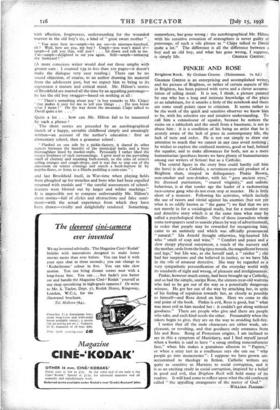PINKIE AND ROSE
Brighton Rock. By Graham Greene. (Heinemann. 73. 6d.)
GRAHAM GREENE is an enterprising and accomplished writer; and his picture of Brighton, or rather of certain aspects of life in Brighton, has been painted with verve and a clever accumu- lation of telling detail. It is not, I think, a picture painted by one who has a long and intimate knowledge of the place as an inhabitant, for it smacks a little of the notebook and there are some small points open to criticism. It seems rather to be the work of the quick and sensitive observer we know him to be, with his selective eye and intuitive understanding. To call him a cohnoisseur of squalor, because he notices the stains on a tablecloth and the smell from a basement, is not to abuse him : it is a condition of his being an artist that he is acutely aware of the lack of grace in contemporary life, the lack of taste and order. He is not out simply to draw our attention to much that we cannot in any case avoid noticing ; he wishes to explore the confused motives, good or bad, behind the squalor, and to make allowances for both, not as a mere humanitarian (goodness knows we have plenty of humanitarians among our writers of fiction) but as a Catholic.
The central figure in the story (tone could hardly call him the hero) is also a Catholic, a seventeen-year-old product of a Brighton slum, steeped in delinquency. Pinkie Brown, non-smoker and non-drinker, with his " grey ancient eyes," his diseased puritanism, " soured virginity," and sadistic behaviour, is at that tender age the leader of a racketeering race-course gang who do not even stop at murder. He is little short of a monster. Following his activities, which inclnde the use of razors and vitriol against his enemies (but not yet what is so oddly known as " the game ") we find that we are not merely in for a sociological study, but for a murder story and detective story which is at the same time what may be called a psychological thriller. One of those journalists whom some newspapers send to seaside places by way of advertisement, in order that people may be rewarded for recognising him, came to an untimely end which was officially pronounced. " natural." Ida Arnold thought otherwise, big-hearted Ida who " smelt of soap and wine." " Comfort and peace and a slow sleepy physical enjoyment, a touch of the nursery and the mother, stole from the big tipsy mouth, the magnificent breasts and legs," but Ida was, as she herself said, a " sticker " ; she had her Suspicions and she believed in justice, so.we have Ida in the role of amateur detective. She may be regarded as a very sympathetic personification of the everyday world with its standards of right and wrong, of pleasure and irreligiousness.
Pinkie, however much astray, had been brought up a Catholic, and so had the simple, -unripe Rose, the sixteen-year-old waitress who had to be got out of the way as a potentially dangerous witness. He got her out of the Way by attaching her, in spite of his feeling of repulsion towards her, as closely as possible to himself—and Rose doted on him. Here we come to the real point of the book. Pinkie is evil, Rose is good, but " what was most evil in him needed her : it couldn't get along without goodness." There are people who give and there are people who take, and each kind needs the other. Presumably when the takers begin to give, they are on the way to avoiding hell-fire.
I notice that all the male characters are either weak, un- pleasant, or revolting, and that goodness only emanates from Ida and Rose. Being of Protestant origins, I am inclined to see in this a symptom of Mariolatry, and I find myself jarred when a bookie is said to have " a smug smiling nonconformist face," when Ida makes a gratuitous allusion to " Papists," or when a stray tart in a roadhouse says she can see " why people go into monasteries" : I suppose we have grown =- accustomed to theolOgy in fiction. Catholic writers are quite as sensitive as Marxists to social corruption, and it is as an exciting study in social corruption, inspired by a belief in good and evil, that Brighton Rock will hold many of its readers. It will lead some to reflect upon what the old confess or called " the appalling strangeness of the mercy of God."










































 Previous page
Previous page